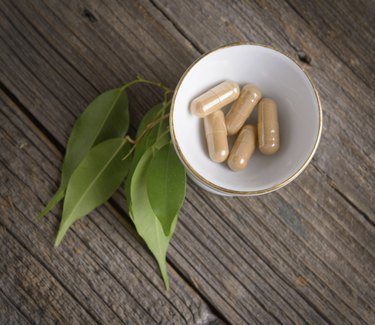
Stress is pervasive in modern-day society. Long-term stress can have numerous negative consequences for your health -- physically, mentally and emotionally. Ashwagandha and rhodiola are herbs that are used for stress management and to address other health ailments. While they share some similarities, each herb has unique properties. As with all herbs, it's important to consult a qualified health care professional to determine whether they're appropriate and safe for your individual needs.
Ashwagandha
Video of the Day
Ashwagandha, also known by its Latin name, Withania somnifera, and its English name, winter cherry, is a nightshade-family plant that's native to the drier tropical regions of southwest Asia, northern Africa and the Mediterranean. Ashwagandha has been used for more than 3,000 years in Ayurveda -- the traditional-medicine system of India -- to enhance energy, memory and endurance, as well as to alleviate stress, weakness, insomnia, arthritis, asthma, depressed immunity, sexual difficulties and infertility. According to the University of Michigan Health System, ashwagandha contains the active compounds withanolides, which account for its therapeutic activity, especially pertaining to inflammation, immunity, memory and stress.
Video of the Day
Rhodiola
Rhodiola rosea, also called golden root, Arctic root and roseroot, grows in the Arctic and mountainous regions of Europe and Asia. It's a member of the Crassulaceae family. Rhodiola is popular in the traditional-medicine systems of eastern Europe and Asia, where it's used to rejuvenate the nervous system, enhance work performance, combat fatigue, reduce stress, decrease depression and enhance fertility. The UMHS attributes rhodiola's medicinal properties to its phenylpropanoids, phenylethanol derivatives, flavonoids, monoterpenes, triterpenes and phenolic acids.
Similarities and Differences
For both ashwagandha and rhodiola, the root used to make medicine. Both herbs are employed by herbalists to combat stress and fatigue, support the nervous system, enhance endurance and address infertility. Within the realm of scientific study, ashwagandha's strongest therapeutic capabilities lie in reducing pain and swelling in arthritis and supporting immune system function. Rhodiola's prominent scientifically supported functions are enhancing the body's resistance to stress, increasing physical endurance, and diminishing fatigue and anxiety. In addition to their main medicinal uses, ashwagandha and rhodiola each have unique therapeutic nuances -- professional herbalists are familiar with such subtleties and can help advise which herb is appropriate for you.
Caution
Practitioners of herbal medicine do not typically encounter toxicity with ashwagandha or rhodiola; however, because all herbs can have strong effects on the body and may interact with medications, they should be used under the guidance of a botanically trained health care professional. Also, ashwagandha should be avoided in pregnancy.